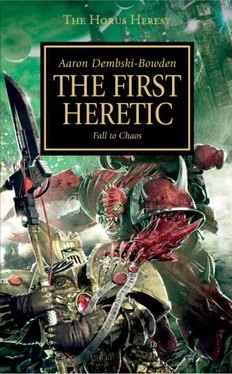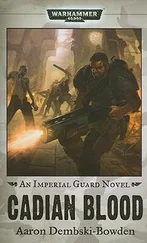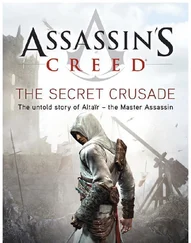Aaron Dembski-Bowden - The First Heretic
Здесь есть возможность читать онлайн «Aaron Dembski-Bowden - The First Heretic» весь текст электронной книги совершенно бесплатно (целиком полную версию без сокращений). В некоторых случаях можно слушать аудио, скачать через торрент в формате fb2 и присутствует краткое содержание. Жанр: Боевая фантастика, на английском языке. Описание произведения, (предисловие) а так же отзывы посетителей доступны на портале библиотеки ЛибКат.
- Название:The First Heretic
- Автор:
- Жанр:
- Год:неизвестен
- ISBN:нет данных
- Рейтинг книги:3 / 5. Голосов: 1
-
Избранное:Добавить в избранное
- Отзывы:
-
Ваша оценка:
- 60
- 1
- 2
- 3
- 4
- 5
The First Heretic: краткое содержание, описание и аннотация
Предлагаем к чтению аннотацию, описание, краткое содержание или предисловие (зависит от того, что написал сам автор книги «The First Heretic»). Если вы не нашли необходимую информацию о книге — напишите в комментариях, мы постараемся отыскать её.
The First Heretic — читать онлайн бесплатно полную книгу (весь текст) целиком
Ниже представлен текст книги, разбитый по страницам. Система сохранения места последней прочитанной страницы, позволяет с удобством читать онлайн бесплатно книгу «The First Heretic», без необходимости каждый раз заново искать на чём Вы остановились. Поставьте закладку, и сможете в любой момент перейти на страницу, на которой закончили чтение.
Интервал:
Закладка:
‘I understand, lord.’
‘Tell me: your expeditionary fleet – which was it, again?’
‘The 1,301st, sire. Commanded by Fleetmaster Baloc Torvus, currently engaged in the Atlas subsector.’ And awaiting reinforcement, he didn’t add out loud.
‘Yes,’ Lorgar nodded. ‘The 1,301st. I have journeyed with eighteen of my Chapters since the dawn of the Great Crusade. This time, as we face our uncertain future, I would ask your permission to travel with the three hundred warriors of the Serrated Sun.’
Argel Tal looked over his shoulder at Cyrene, then Xaphen, before turning back to Lorgar. The Chaplain nodded once. The confessor had her hands over her mouth as tears streamed down her face.
‘Pardon me, sire?’ Argel Tal asked. ‘I am not sure I heard you correctly.’
‘I am asking this favour of you, my son. Kor Phaeron will lead the 47th Expedition in my absence. I may not be able to outrun the Occuli Imperator – he will follow me wherever I go – but I can seek the empyrean far
from my brothers’ eyes. And that is enough for now.’
‘You will... travel with us?’
‘I would be honoured to,’ said the primarch. ‘I could ask this of any of my fleets, I know. But you were the one to raise me back to my feet, when my ignorance had murdered a world. So I am asking you.’
‘I... Sire... I...’
Lorgar laughed again, his golden hands reaching to prevent Argel Tal from kneeling a second time. ‘Is that a yes?’
‘By your word, Aurelian.’
‘Thank you. It’s a new age, Argel Tal. A new age of vision and discovery. Every Word Bearer fleet will be cast to the winds of fate, sailing where they will. We will reach farther from Terra than any other Legion, pushing the Imperium’s boundaries with each world we take.’
Argel Tal knew where this was leading. It could only be going one way. He sensed Xaphen approaching from behind, though the Chaplain elected to say nothing.
‘We are seekers,’ Lorgar smiled, enjoying the word on his tongue. ‘We seek the place where gods and mortals meet – seeking divinity in a galaxy my father believes is godless.’
Lorgar clasped his hands together, and lowered his head in readiness for prayer.
‘The Legion will undertake the Pilgrimage.’
III
The Faceless Tarot
The cards are faceless, devoid of illustration. This is intentional – it’s what makes them so valuable, for they respond to the touch of an unseen sense, never relying on a lesser artist’s imagery to limit the human consciousness.
The crystal wafers are cored by a psychoreactive liquid, the images taking shape in the celadon resin as the tarot reader holds each card in his hands.
He had hoped, in time, that every psychically gifted soul in his father’s Imperium would come to learn this tarot. Instead, their creation had been scorned – even by Magnus (who had no need of such foci for his powers) and Leman Russ (who derided them even as he cast runestones and knucklebones in a bid to see the future).
It will soon be time to leave Colchis.
He turns the first card. In its milky surface, he sees a burning torch carried in a strong hand. Truth.
Something calls to me. That is a truth I am only now coming to accept. Something out there is calling to me.
I am not Magnus, to stare into space and easily hear the heartbeat of creation. My powers are not those of my dearest brother, nor my ascendant father. But something has always called to me. In my youth, it reached my mind as visions, nightmares, hallucinations. And now...
Erebus and Kor Phaeron – through their patience and guidance – aided me in growing attuned to the call.
My tutors in the Covenant, and my heart’s family now. We meditated, pored over the Covenant’s texts, and we decided the Legion’s destiny.
Something calls me, faint but infinite, prickling my sixth sense like an echo in the stars.
He turns the second card, and sees himself – robed and cowled, turning away so as to avoid his own gaze. A common card, this one. Faith.
Humanity is nothing without faith.
Faith raises us above the soulless and the damned. It is the soul’s fuel, and the driving force behind millennia of mankind’s survival. We are hollow without it. Existence is cold and arbitrary in a godless galaxy – faith shapes us, raises us above all other life, defines us as perfect in our sentience.
In eras where faith was choked, weakness and decay infested the species, withering its innards. That is something the Emperor, beloved by all, has always known, but never admits.
Yet he knows, and he forges his empire accordingly. A god need not be named a god in order to stand in supremacy. Names are meaningless. Supremacy matters – and my father stands ascendant over all mortal life in the galaxy: a god in power, a god in wrath, a god in vision.
A god in all but name.
The Old Faith of Colchis is one that shares roots in thousands of human cultures, across thousands of worlds. That alone is evidence that somewhere within its meandering parables, and the unsubtle blending of myth into history and history into myth, there exists a core of absolute truth.
The loveliest legend is that of the empyrean, the Primordial Truth.
It is known by countless names, of course. The empyrean is the name we spoke on Colchis. Others named it heaven – a means of existing into eternity, long after the death of the mortal form. A realm of infinite possibility: a paradise of potential where the souls of every mortal in history coil around one another.
Even I know such things are myths, stories spoken and passed down imperfectly through countless generations.
But... imagine it. Imagine the reality behind the myths. Imagine a place in the universe where gods and mortals meet. Imagine the miracles of power that could be performed.
Imagine a state of utter chaos, utter purity, where anything is possible. Life ends in death, but existence does not.
If there is truth to the Old Faith, I will find it.
He turns the third card. A haze of heat makes the sky shimmer above a skyline of towers and domes. Colchis. The City of Grey Flowers. Home.
The people of Colchis have always looked to the stars for answers. The Legion born on that world, the Bearers of the Word, is no exception. Many Chapters within the Legion are named for the constellations that brighten the night sky. Even the name they bestowed upon me, the name spoken by no one outside the Legion, has its foundations in antiquity. ‘Aurelian’, they call out as they wage war. ‘The golden’.
Yet its linguistic roots go further back, to a truer meaning, created by those ancestors that forever stared skyward for inspiration.
Aurelian. The sun.
It is natural for us to seek answers in the stars. Life comes from them. The Emperor descended from them. The Legion rose into them.
Fate awaits us beyond them.
Colchisian legends tell tales of primitive space-faring vessels leaving the world in search of the gods, much in the same way the Afrikaharan and Grecianic peoples of Ancient Earth once sought their deities. I have read the fragments that remain of their cultures, and I have walked the ways of the past with my brother Magnus. The travels of Osyrus and Odisseon in Terran myth are the travels of Khaane, Tezen, Slanat and Narag – prophets born of Colchis, great seekers now lost to time’s embrace.
Their journey to seek the home of the gods is known to us as the Pilgrimage.
He turns the fourth card. The psychoreactive liquid forms architectural wonders in his fingertips: an arching bridge, a meandering path of stone through a great garden... A journey. A pilgrimage.
Читать дальшеИнтервал:
Закладка:
Похожие книги на «The First Heretic»
Представляем Вашему вниманию похожие книги на «The First Heretic» списком для выбора. Мы отобрали схожую по названию и смыслу литературу в надежде предоставить читателям больше вариантов отыскать новые, интересные, ещё непрочитанные произведения.
Обсуждение, отзывы о книге «The First Heretic» и просто собственные мнения читателей. Оставьте ваши комментарии, напишите, что Вы думаете о произведении, его смысле или главных героях. Укажите что конкретно понравилось, а что нет, и почему Вы так считаете.












